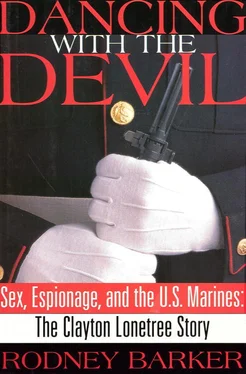“No,” Hathaway replied. “Everything he’s reported to us has either been corroborated, or we have been unable to establish it as untrue. The reliability factor we place on him as an informant is high.”
“Then I’d like to have a face-to-face with him,” McCullah said.
Several days later he drove to a remote northern Virginia location and met the defector. The man’s true identity was disguised—his death in an auto accident had been staged because he had left family behind and did not want his previous employers to know he was in U.S. hands—but it was established that he had been a senior intelligence officer from an Eastern Bloc country. An interpreter was available but unnecessary, for the man spoke passable English. Chain-smoking an acrid, foreign brand of cigarette, he elaborated on what had been written in the memo.
He said all three occasions took place during a trip he’d made to Moscow for a training seminar. The first was a social setting, over dinner with wine, when a general bragged, “You wouldn’t believe what the American Marines have done for us.” The second was a remark made in passing by the aide to a different general, who said essentially the same thing, except he mentioned that in addition to succumbing to the use of women to co-opt them, the Marines had compromised themselves with black-market violations and the like. The third reference came in a classroom setting, when a KGB colonel who was an expert in operations aimed at Americans said their successes were not limited to the Soviet Union but were widespread and included countries all over the world. And he named several.
McCullah left the meeting feeling slightly overwhelmed. Until now the task force had been aimed at Lonetree and Bracy and a few of their cohorts. Factoring in this defector information, he knew the scope of Bobsled was going to have to be amplified. If NIS was going to be thorough in its efforts to determine the extent of MSG recruitment by foreign intelligence, it was going to have to look well beyond the Marines who had served in diplomatic missions within the Soviet Union. It would have to proceed as though the Soviet intelligence services were not only engaged in a full-blown worldwide effort to penetrate U.S. diplomatic missions but, with the help of the Marine security guards, had been hugely successful.
NIS had always thought of itself as a never-say-no, can-do outfit, and with the seeds of an epidemic diagnosed, McCullah jacked up the NIS response. To handle the increased workload, he brought in a deputy on the senior management level: Goethe “Bud” Aldridge was a tall, silver-haired, physically and mentally tough former Marine, a previous director of Criminal Investigations at NIS with twenty-five years in operational field assignments worldwide, known to be a troop handler and someone with a low tolerance for malingerers and bureaucrats. Then McCullah doubled the number of agents assigned to Bobsled. And knowing he did not have the resources to adequately cover virtually every embassy in every country served by MSGs, he asked the CIA and NSA to grade a list of countries from an overall threat posture: Which contained the largest number of KGB agents? How active were they? What were America’s national interests in those countries? Adding those to the five or six countries singled out by the defector, and throwing in some others from a cover standpoint, the NIS was able to narrow the number down to a manageable figure and then prioritize.
The task force was putting in seven-day workweeks, often fourteen to sixteen hours a day, arranging interviews, receiving results, cross-checking information and looking for patterns and connections between people, and sending out the latest data to agents in time to prepare them for upcoming interviews. But there existed a sense of euphoria among the members, because this was a front-page case and all knew they were involved in the biggest event of their professional lives.
There was also a vindication factor at work. It was a commonly held notion within law enforcement that the Naval Investigative Service was a second-rate investigative agency. Its agents were occasionally maligned—it was said those who didn’t make the FBI cut settled for NIS. There had been allegations that some of its investigations had been diverted or thwarted by command influence, and critics had made the NIS walk the plank for not detecting the Walker family spy ring before Mrs. Walker disclosed its existence to the FBI, and for not terminating the security clearance of Jonathan Jay Pollard in view of his known character flaws, although it had been the NIS that had first suspected Pollard of spying and it was the NIS that captured him on video stealing classified documents. While NIS officials felt most of the bad press that darkened its reputation was unfair when it wasn’t downright mistaken, there was no denying that a good part of the adrenaline that drove the members of Bobsled came from the knowledge that this investigation gave the NIS a chance for a big win for a change.
Up until now, just about everything NIS had done had been blessed by the other counterintelligence agencies in town. Every step NIS had taken had been viewed by representatives of the FBI and CIA, who had also been invited to sit in on the brainstorming sessions, and not once had NIS been criticized for the way it was doing things. Not once had any of its esteemed colleagues said, You’re overlooking this, or You might want to consider that. Not once did anyone say this investigation was beyond NIS’s abilities.
Indeed, as director of Bobsled, Lanny McCullah was being accorded the respect you would expect of an FCI czar. He was in great demand as a speaker around Washington by people wanting updates on the progress of the investigation. In the first two weeks of April alone, he spoke before the Senate Select Committee on Intelligence, the House Armed Services Committee, the Defense Counterintelligence Board, the President’s Intelligence Oversight Board, and the House Permanent Subcommittee for Intelligence. All wanted status reports on the investigative results: How many people have you talked to? How many violations were admitted to? How many DIs (deceptions indicated) on espionage questions?
Essentially everyone was interested in the same thing—the numbers, which McCullah provided like a box score. “We talked to five yesterday, and three admitted to infractions: five and three.” But when you brief a committee, you aren’t there just to provide information, you’re there to tell a story and send a message. And the members wanted to hear McCullah’s personal assessment of the significance of the numbers.
Each time, he sounded the caution that the figures could be misleading because the evidence that would allow them to prosecute, much less convict, had yet to be collected. That said, when he described his vision of what had happened and how bad he thought it was, the way he spoke gave everyone the impression that when the NIS was done flushing out all the spies, this was going to be the biggest espionage case of the century.
The slant was alarming. The speculations sensational. People came away awed. And at the time it didn’t seem like much of a leap to believe that Bobsled would prove McCullah right.
• • •
In none of his statements had Sergeant Lonetree ever said anything about letting foreign agents into the U.S. Embassy, and when Mike Stuhff asked him about it, Lonetree emphatically denied anything like that had happened. Yes, he knew Arnold Bracy, but he had no idea why he was saying these things. They were not true, they did not happen.
Mike Stuhff believed his client. He didn’t know what was going on with Arnold Bracy, but with five additional espionage-related charges filed against Sergeant Lonetree based on Bracy’s allegations, and with his client now confronting capital offenses, Stuhff knew he would need some time before he could effectively refute the charges. So at the next Article 32 session he requested a three-week continuance to give the defense a chance to examine the evidence.
Читать дальше












